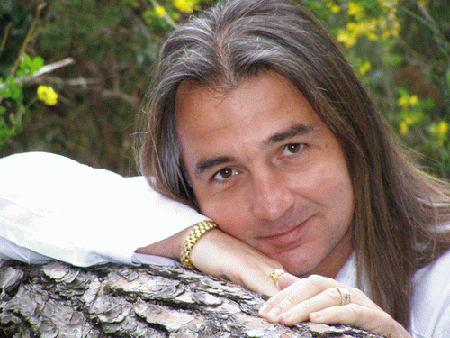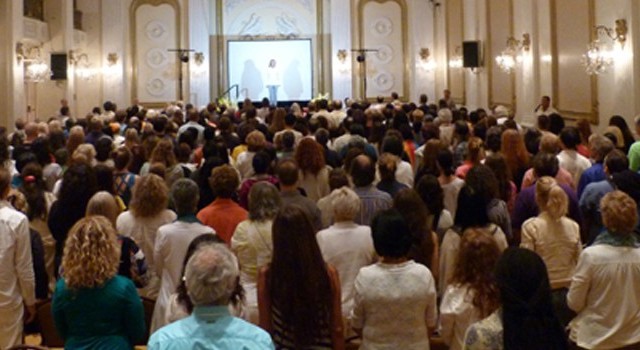An Afternoon in the Gaze of Braco
by Brendan O’Connor

Braco is a middle-aged Croatian man with long, graying hair and a face permanently molded into a close-lipped smile. His eyes are dark, soft and gooey, like slightly melted Tootsie Rolls, and tens of thousands of people have traveled enormous distances to be caught, if only for a moment, in their field of view.
“Braco does not teach, talk or diagnose to give treatments — he simply gazes in silence and offers his gift to visitors — independent from religion, ideology, race, color and culture,” his website states. “Amazing transformations happen, and many find new power, vitality and a zest for life resulting from their experience.” His verified Facebook adds, “many report about improvements on different levels of their lives.” Braco’s followers claim that His Gaze has lifted depression, cured illness (including cancer!), and restored brain function.
Braco was in New York this weekend for the summer solstice, holding hourly sessions in which he shared his Gaze from ten in the morning until six in the evening. Neither children nor women pregnant past their first trimester were allowed to receive his gaze. I am neither a child nor a pregnant woman, and so I bravely ventured to Midtown Manhattan on Sunday morning, where Braco was in residence at the Wyndham New Yorker hotel.
11:51
The crowd inside, especially on the second floor, is much the same as they are immediately outside — mostly white, mostly middle-aged. Nobody looks particularly healthy, but everyone is smiling. I walk past a long table with lots and lots and lots of Braco-branded DVDs; his face is everywhere — DVDs, books, posters. It’s like being in a hall of mirrors, but with Vigo, the kind of lame villain from Ghostbusters II.
11:52
The next session is due to take place at noon in the Grand Ballroom. Someone asks me for a ticket. I don’t have one. A woman (smiling, always smiling) directs me back out the door to where tickets are being sold for eight dollars. Most of Braco’s volunteers — wearing badges that say “Volunteer” and “Braco Gazing Event” — are women. The volunteer selling tickets looks up at me with wide eyes and asks, “Cash or credit?” I begin to pull my wallet out of my pocket before I find myself saying, “Um, actually, I need to go to an ATM? I’ll be right back.” This is a lie, because something is telling me to leave. As I turn, she reaches out and tells me to wait just a minute. She bends down underneath the table between us, rummaging for something, popping back up occasionally to check that I am still there before coming back up with a ticket that has “complimentary” printed across it in purple block letters.
(It’s not clear how many Special Complimentary Tickets are given out. The box from which the woman removed the ticket was quite full, so potentially there could be quite a few folks who are as special as I apparently am, but the box hadn’t been readily available and seemed buried under lots of other things, so I think it’s fair to infer that I must be pretty special.)
“Oh!” I say. “Oh! Uh. Wow. Um. Thanks!”
11:55
I walk back down the hallway toward the Grand Ballroom and hand over my complimentary ticket. Three women usher me in. The ballroom is large and ornate and I feel like I’ve been transported to the Overlook Hotel.
Three broad-shouldered, middle-aged white men stand against the wall, studying the crowd. I find a seat next to a woman who proceeds to pick at her teeth with her Metrocard. The ballroom is about half-full; I estimate there are somewhere between a hundred and a hundred-fifty people here. At eight bucks a head, that’s somewhere between $800 and $1200 in revenue.
12:00
A tall, blonde woman named Angelika Whitecliff, the author of 21 Days With Braco, comes out. She introduces the musician David Young, a Braco devotee who claims to channel the ghost of George Harrison. Young plays two flutes at the same time.
12:07
Young finishes his performance and Whitecliff returns to the stage. She speak at length about the books and DVDs Braco has written and produced, as well as the thirteen books that his mentor, Ivica Prokic, wrote to help us (“us”) face our problems and difficulties. One of them is newly available in translation.
“The good and evil are not far apart,” Ivica wrote. “They are side by side. It goes in a circle. It goes and goes. After every day comes the night, but fortunately after every night comes the day.”
Ivica believed that a piece of the sun resided within him.
12:15
“We have a choice to focus on the good,” Whitecliff says. “I’ve seen people with just the worst depression come to The Gaze, and that depression is lifted.” People around me are nodding. Presumably they too have experienced, or witnessed, this phenomenon. “Braco shares this gift equally. All we have to do is be open to receive it.”
Whitecliff tells us about all of the people she’s heard about who, when they come to share Braco’s Gaze and watch his DVDs and read his books and buy his merchandise, they can face their problems. “They say that when they meet the same types of challenges [as they had before they came to know Braco] they gracefully sail through them. It’s the same situation but they’re not the same,” Whitecliff tells us. “That’s a remarkable gift that Braco is helping so many people to realize.”
12:21
Whitecliff asks how many people are here for the first time. I see four raised hands.
Whitecliff introduces a clip in which a Vietnam veteran talks about his experience with Braco. The vet suffered from post-traumatic stress disorder for decades after the war; after his fourth time sharing Braco’s gaze, his PTSD was lifted. “It was real,” he tells the camera, tears in his eyes. Then he was diagnosed with stomach cancer — but falsely, it turns out. “That man saved my life,” he says. “And I’ve got the paperwork to prove it.”
12:25
The video is over. Whitecliff asks us to turn off our cellphones. “Now is your time to meet Braco’s Gaze,” she says, asking us to place any photographs we may have of loved ones over our hearts. We all stand, and breathe deeply.
12:26
Braco emerges, trailed by a (very attractive) younger woman. He is wearing a white, flowing shirt and tight jeans. Like, really tight. They are stone washed and, if I am not mistaken, flared.
Braco stands on the stage and Gazes out at the audience, turning his whole body slowly from one side of the room to the other. His posture is weirdly stiff, his legs pressed tightly together and his arms held slightly out from his sides.
12:30
Braco leaves.
12:31
“I hope you feel better!” Whitecliff says. A microphone is handed to Theresa, from Colorado, who shares her Braco story: her son was in the movie theater in Aurora; he was not hurt. (His friend was killed.) She attributes this to having received Braco’s Gaze via live-stream some weeks before.
12:36
We are dismissed.

12:42
I examine the merchandise. There is something called “Sun Jewelry.” The most budget-friendly item the cuff ring, encrusted with white diamonds, is selling for $2700; the most expensive item is the one carat sun pendant for $7200. I didn’t see anyone buy any.
There are about twenty DVDs for $20 each; Braco’s book After the Great Tragedy is $16, while Whitecliff’s book 21 Days with Braco is $21. An album called Thank You Braco is $15. A volunteer whose name tag says her name is “Vanaja” explains that there are two DVDs which include “The Voice” — in which Braco speaks. (A note on Braco’s site reads: “Please know that Braco never personally contacts people or communicates with people directly. He does not give any interviews and he does not speak in public.”)
Each DVD, however — with or without The Voice — has been “energized,” which means that if you have a stomach ache or a headache you can place the whole DVD or the case on your body, where you feel the pain, or under your pillow overnight, and it will be lifted. “Like, fifteen, twenty minutes,” Vanaja says.
12:45
I leave, but I am still not feeling any of the purported effects of the gaze, perhaps because Braco and I never made actual eye contact. I’m a little anxious, even.
Outside the hotel, no one is smiling, because it is Midtown, so why would you? That makes me feel a lot better.
Brendan O’Connor is a reporter in New York.
Photos from Braco.net
